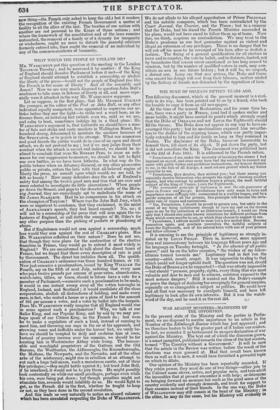THE DUKE OF ORLEANS FIFTEEN YEARS AGO.
THE following document, which at the present moment is a curi- osity in its way, has been pointed out to us by a friend, who took the trouble to copy it from an old newspaper. At the time of the second Restoration, and for some time be- fore, there was a party in France, (and had it spoken earlier and more boldly, it might have carried its point) which strongly urged that the Duke of ORLEANS and not Louis the Eighteenth should fill the throne. The Duke does not appear in any way to have en- couraged this party; but its machinations exposed him neverthe- less to the dislike of the reigning house, which was pretty impar- tially extended to him and his family as long as they remained in France. The disclaimer of the Duke, however honourable to himself then, fell short of its object. It put down the party, but it did not conciliate the King. The document was published here on the 22d of June 1815. It is addressed to the French nation.
" Frenchmen—I am under the necessity of breaking the silence I had imposed on myself, and since some have had the audacity to connect my name with guilty wishes and perfidious insinuations, my honour dictates to me, in the face of all Europe, a most solemn protest which my duties prescribe to me. " Frenchmen, they deceive, they mislead you ; but those among you especially deceive themselves who arrogate the right of choosing another master, and who outrage by seditious hopes a prince, the most faithful subject of the King of France, Louis the Eighteenth.
" The irrevocable principle of legitimacy is now the sole guarantee of peace in France and Europe. Revolutions have only made its force and importance more strongly felt: consecrated by a warlike league, and by a pacific congress of all the pi-inces, this principle will become the inva- riable rule of reigns and successions. "Yes, Frenchmen, I should be proud to govern you, but solely in the event of my being unfortunate enough to have my seat on the throne open to me by the extinction of an illustrious branch, I would see then only that I should also make known intentions far different perhaps from those which some ascribe to me, or which they choose to suggest to me.
" Frenchmen, I address myself to none but a few misled men. Become yourselves again, and proclaim yourselves the faithful subjects of Louis the Eighteenth, and of his natural heirs with one of your princes and fellow citizens."
It is amusing to see the principle of legitimacy so strongly in- sisted on by Louis PHILIP. There is, however, more apparent than real inconsistency between his language fifteen years ago and his language on Tuesday fortnight. " In the absence of all public power," said he on the latter occasion, " the wishes of my fellow- citizens turned towards me." Legitimacy had in fact run the country—abut, evasit, erupit. It was impossible to cling to that which could not longer uphold itself. The question was not, should the Duke of BORDEAUX be supported ?—that was utterly impossible —but should "persons, property, rights, every thing that was most valuable and dear to men and to citizens, continue exposed to the most serious dangers." Still it wanted not the Duke's example to prove the danger of declaring too sweepingly for general maxims, especially on so changeable a subject as politics. He could have said all that was necessary to exculpate himself, and have left legitimacy to look after its own interests. But it was the watch- word of the day, and he used it as the rest did.


























 Previous page
Previous page